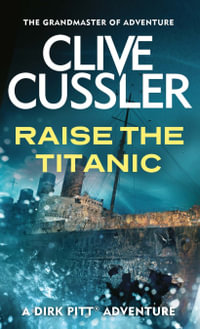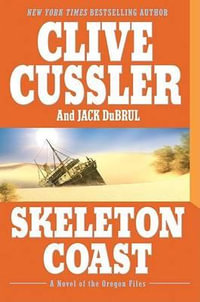
Sorry, we are not able to source the book you are looking for right now.
We did a search for other books with a similar title, however there were no matches. You can try selecting from a similar category, click on the author's name, or use the search box above to find your book.
In 1856, a British clipper ship sinks after a storm while transporting convicts to an Australian penal colony. After horrible carnage on a raft, the pitiful survivors, among them Betsy Fletcher and Jess Dorsett, are washed up on a solitary tropical island, where they discover an immense source of diamonds and found a powerful and wealthy dynasty. One hundred forty years later, Maeve Fletcher, on of their descendants, is stranded on an island in Antarctica with a party of passengers after their cruise ship seemingly abandons them.
Dirk Pitt, on an expedition to find the source of a deadly plague that is killing dolphins and seals in the Weddell Sea, finds Maeve and the passengers and rescues them from death. When Pitt later uncovers the cause of the plague, he discovers that Maeve's father, Arthur Dorsett, and her two sisters are responsible because of their diamond-mining technology. A deadly race develops to stop Dorsett from continuing his murderous mining operations and to head off a disaster that will kill millions.
Pitt's struggle to foil Dorsett's ruthless plan to destroy the market for diamonds and thus gain a monopoly of his own takes him from harrowing adventures off the west coast of Canada to being cast adrift in the Tasman Sea in a small boat with his good friend Al Giordino and the lovely Maeve Dorsett.
Through trial by storms, hunger, and thirst, Pitt's inventive genius and relentless drive to survive eventually bring him to a final, spine-chilling confrontation with Arthur Dorsett himself, at the very heart of his domain, with the clock ticking against devastating tragedy - a confrontation in which Pitt gains triumph, but at the cost of great personal loss, as he discovers a lethal surprise that will shock and astonish the reader.
January 14, 2000
Seymour Island,
Antarctic Peninsula
There was a curse about the island. A curse proven by the graves of men who set foot on the forbidding shore, never to leave. Seymour Island made up the largest ice-free surface on or near the whole continent of Antarctica. It was a singularly ugly place, inhabited only by few varieties of lichen and a rookery of Adélie penguins.
The majority of the dead, buried in shallow pits pried from the rocks, came from a Norwegian Antarctic expedition after their ship was crushed in the ice in 1859. They survived two winters before their food supply ran out, finally dying off one by one from starvation. Lost for over a decade, their well-preserved bodies were not found until 1870, by the British while they were setting up a whaling station.
The restless ghosts of the explorers and sailors that roamed the forsaken ground could never have imagined that one day their resting place would be crawling with accountants, attorneys, plumbers, housewives and retired senior citizens who showed up on luxurious pleasure ships to gawk at the inscribed stones and ogle the comical penguins that inhabited a piece of the shoreline.Perhaps, just perhaps, the island would lay its curse on these intruders too....
The impatient passengers aboard the cruise ship Polar Queen saw nothing ominous about Seymour Island. Safe in the comfort of their floating palace, they felt only excitement at a new experience, especially since they were among the first wave of tourists ever to walk the shores of Seymour Island.
Many had traveled Europe and the Pacific, seen the usual exotic places travelers flock to around the world. Now they wanted something more, something different; a visit to a destination few had seen before, a remote place they could set foot on and brag about to friends and neighbors afterward.
As they clustered on the deck near the boarding ladder in happy anticipation of going ashore, aiming their telephoto lenses at the penguins, Maeve Fletcher walked among them, checking the bright orange insulated jackets passed out by the ship's cruise staff, along with life jackets for the short trip between the ship and shore.
Maeve was three years shy of thirty, with a master's degree in zoology. Energetic and in constant motion, she towered above the women and stood taller than most of the men. Her hair, braided in two long pigtails, was as yellow as a summery iris. She stared through eyes as blue as the deep sea, from a strong face with high cheekbones. Her lips always seemed parted in a warm smile, revealing a tiny gap in the center of her upper teeth. Tawny skin gave her a robust outdoorsy look.
This trip there were ninety-one paying passengers on board, and Maeve was one of four naturalists who were to conduct the excursions on shore. Maeve was scheduled to accompany the first party of twenty-two visitors to the island. She checked off the list of names as the excited travelers stepped down the boarding ladder to a waiting Zodiac, the versatile rubber float craft designed by Jacques Cousteau. As she was about to follow the last passenger, the ship's first officer, Trevor Haynes, stopped her on the boarding ladder.
"Tell your people not to be alarmed if they see the ship sailing off," he told her.
She turned and looked up the steps at him. "Where will you be going?"
"There is a storm brewing a hundred miles out. The captain doesn't want to risk exposing the passengers to any more rough water than necessary. Nor does he want to disappoint them by cutting short the shore excursions. He intends to steam twenty kilometers up the coast and drop off another group at the seal colony, then return in about two hours to pick you up and repeat the process."
"Putting twice the number ashore in half the time."
"That's the idea. That way, we can pack up and leave and be in the relatively calm waters of the Bransfield Strait before the storm strikes here. You have your portable communicator should you encounter a problem."
Maeve held up the small unit that was attached to her belt. "You'll be the first to know."
"Say hello to the penguins for me."
"I shall."
As the Zodiac skimmed over water that was as flat and reflective as, a mirror, Maeve lectured her little band of intrepid tourists on the history behind their destination. "Seymour Island was first sighted by James Clark Ross in 1842. Forty Norwegian explorers, castaway when their ship was crushed in the ice, perished here in 1859. We'll visit the site where they lived until the end and then take a short walk to the hallowed ground where they are buried."
"Are those the buildings they lived in?" asked a lady who must have been pushing eighty, pointing to several structures in a small bay.
"No," answered Maeve. "What you see are what remains of an abandoned British whaling station. We'll visit it just before we take a short hike around that rocky point you see to the south, to the penguin rookery."
"Does anyone live on the island?" asked the same lady.
"The Argentineans have a research station on the northern tip of the island."
"How far away?"
"About thirty kilometers."
They could see the bottom clearly, now, naked rock with no growth to be seen anywhere. Their shadow followed them about two fathoms down as they cruised through the bay.
Maeve felt a tinge of regret she couldn't quite understand as the yellow-and-white Polar Queen grew smaller in the distance. For a brief moment she experienced the apprehension the lost Norwegian explorers must have felt at seeing their only means of survival disappear. She quickly shook off any feelings of uneasiness and began leading her party across the gray moonscape to the cemetery.
She allotted them twenty minutes to pick their way among the tombstones, shooting rolls of film of the inscriptions. Then she herded them around a vast pile of giant bleached whale bones near the old station while describing the methods the whalers used to process the whales.
"After the danger and exhilaration of the chase and kill," she explained, "came the rotten job butchering the huge carcass and rendering the blubber into oil. 'Cutting in' and 'trying out,' as the old-timers called it."
Next came the antiquated huts and rendering building. The whaling station was still maintained and monitored on an annual basis by the British and was considered a museum of the past. Furnishings, cooking utensils in the kitchen, along with old books and worn magazines, were still there just as the whalers left them when they finally departed for home.
"Please do not disturb any of the artifacts," Maeve told the group. "Under international law nothing may be removed." She took a moment to count heads. Then she said, "Now I'll lead you into the caves dug by the whalers, where they stored the oil in huge casks before shipping it to England."
From a box left at the entrance to the caves by expedition leaders from previous cruises, she passed out flashlights. "Is there anyone who suffers from claustrophobia?"
One woman who looked to be in her late seventies raised her hand. "I'm afraid I don't want to go in there."
"Anyone else?"
The woman who asked all the questions nodded. "I can't stand cold, dark places."
"All right," said Maeve. "The two of you wait here. I'll conduct the rest a short distance to the whale-oil storage area. We won't be more than fifteen minutes."
She led the group through a long, curving tunnel carved by the whalers to a large storage cavern stacked with huge casks that had been assembled deep inside the rock and later left behind. After they entered she stopped and gestured at a massive rock at the entrance.
"The rock you see here was cut from inside the cavern and acts as a barrier against the cold and to keep competing whalers from pilfering surplus oil that remained after the station closed down for the winter. This rock weighs as much as an armored tank, but a child can move it, providing he or she knows its secret." She paused to step aside, placed her hand on a particular place on the upper side of the rock and easily pushed it the entrance. "An ingenious bit of engineering. The rock is delicately balanced on a shaft through its middle. Push in the wrong spot and it won't budge."
Everyone made jokes about the total darkness broken only by the flashlights as Maeve moved over to one of the great wooden casks. One had remained half full, and she held a small glass vial under a spigot and filled it with a small amount of oil. She passed the vial around, allowing the tourists to rub a few drops between their fingers.
"Amazingly, the cold has prevented the oil from spoiling, even after nearly a hundred and thirty years. It's still as fresh as the day it came from the cauldron and was poured into the cask --"
Maeve was abruptly cut off by the scream of an elderly woman who frantically clutched the sides of her head. Six other people followed suit, the women crying out, the men groaning.
Maeve ran from one to the other, stunned at the look of intense pain in their eyes. "What is it?" she shouted. "What's wrong? Can I help you?"
Then suddenly it was her turn. A daggerlike thrust of pain plunged into her brain, and her heart began to pound erratically. Instinctively her hands pressed her temples. Then she was struck by a tidal wave of dizziness rapidly followed by great nausea. She fought an overwhelming urge to vomit before losing all balance and falling down.
No one could understand what was happening. The air became heavy and hard to breathe. The beams of the flashlights took on an unearthly bluish glow. There was no vibration, no shaking of the earth, and yet dust began to swirl inside the cavern.
Everyone began to sag and fall to the ground. One moment people stared at death from an unknown source. Then inexplicably, an instant later, the excruciating agony and vertigo began to ease. As quickly as it had come on, it faded and disappeared.
Maeve felt exhausted to her bones. She leaned weakly against the cask of whale oil, eyes closed, vastly relieved at being free of pain.
No one found the voice to speak for nearly two minutes. Finally, a man, who was cradling his stunned wife in his arms, looked up at Maeve. "What was that?"
Maeve slowly shook her head. "I don't know," she answered dully.
With great effort she made the rounds, greatly cheered at finding everyone still alive. They all appeared to be recovering with no lingering effects. Maeve was thankful that none of the more elderly had suffered permanent damage, especially heart attacks.
"Please wait here and rest while I check the two ladies at the entrance of the tunnel and contact the ship." She swung open the massive door and walked through the portal until the beam of her flashlight vanished around a curve in the tunnel.
As soon as Maeve reached daylight again, she couldn't help wondering if it had all been a hallucination. The sea was still calm and blue. The sun had risen a little higher in a cloudless sky. And the two ladies who had preferred to remain in the open air were lying sprawled on their stomachs, each clutching at nearby rocks as if trying to keep from being torn away by some unseen force.
She bent down and tried to shake them awake but stiffened in horror when she saw the sightless eyes and the gaping mouths. They were dead.
Maeve ran down to the Zodiac, which was still sitting with its bow pulled onto the shoreline. The crewman who had brought them ashore was also lifeless, the same appalling expression on his face. In numbed shock, Maeve lifted her portable communicator and began transmitting. "Polar Queen, this is land expedition one. We have an emergency. Please answer immediately. Over."
There was no reply.
She tried again and again to raise the ship. Her only response was silence. It was as if Polar Queen and her crew and passengers had never existed.
Copyright © 1998 by Clive Cussler
ISBN: 9780743449670
ISBN-10: 0743449673
Series: Dirk Pitt Novel
Published: 1st November 2002
Format: Paperback
Language: English
Number of Pages: 544
Audience: General Adult
Publisher: Simon & Schuster UK
Country of Publication: GB
Edition Number: 2
Edition Type: Revised
Dimensions (cm): 17.8 x 11.1 x 3.6
Weight (kg): 0.29
Shipping
| Standard Shipping | Express Shipping | |
|---|---|---|
| Metro postcodes: | $9.99 | $14.95 |
| Regional postcodes: | $9.99 | $14.95 |
| Rural postcodes: | $9.99 | $14.95 |
How to return your order
At Booktopia, we offer hassle-free returns in accordance with our returns policy. If you wish to return an item, please get in touch with Booktopia Customer Care.
Additional postage charges may be applicable.
Defective items
If there is a problem with any of the items received for your order then the Booktopia Customer Care team is ready to assist you.
For more info please visit our Help Centre.























